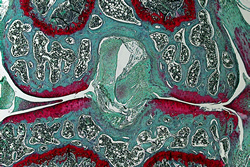Faculty researchers have been awarded £1.3million by the European Union to fund a five-year study which aims  to boost understanding and inform future treatments of osteoarthritis and other skeletal diseases. They will harness their knowledge of less complex skeletal diseases, such as dwarfism, in an attempt to learn more about common conditions such as osteoarthritis, which have a more complex genetic element.
to boost understanding and inform future treatments of osteoarthritis and other skeletal diseases. They will harness their knowledge of less complex skeletal diseases, such as dwarfism, in an attempt to learn more about common conditions such as osteoarthritis, which have a more complex genetic element.
The Wellcome Trust Centre for Cell-Matrix Research is leading the research. Professor Ray Boot-Handford said:
“Skeletal diseases like osteoarthritis present a major social, economic, and healthcare challenge which is set to rise as we live longer. The concept behind this research is to study and integrate through modelling the cellular and tissue effects of both common and rare skeletal diseases to gain a better understanding of how they work, how the disease progresses, and age-related changes. This will help us find markers, perhaps a blood or urine test like you currently have for diabetes, to show who suffers from early stages of these diseases. This will help determine whether potential treatments are working.”
The funding is part of a £10million pound programme looking at systems biology for the functional validation of genetic determinants of skeletal diseases (known as SYBIL). Seven European Countries are involved as part of the EU’s FP7 Health Innovation 2013 grant. Research began this month, with the hope of identifying new and more effective treatments for these common diseases.
